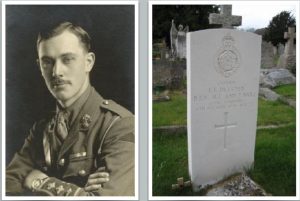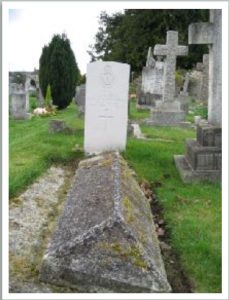1st and 2nd Battalion, Royal Fusiliers

James Ferrand Dearden was born on 29 September 1896, the son of Peregrine Robert and Annie Abbott Dearden. He attended Cheltenham College between 1907 and 1913, from where he entered the Royal Military College, Sandhurst. On 1 October 1914 he was granted a commission in the 1st Battalion Royal Fusiliers (City of London Regiment), was promoted Lieutenant on 13 June 1915 and made temporary Captain on 27 February 1916. On 13 March 1918 he was appointed Brigade Major.
During the Battle of the Somme his battalion was engaged in the struggle for Delville Wood and for his part in this, Captain Dearden was awarded the Military Cross. He was later to earn two bars to this award and during the Arras offensive in April 1917 he received the Distinguished Service Order, the award of which was announced in the London Gazette on 17 April 1917 in recognition of his part in the Battle of Vimy. In the battle, Captain Dearden jumped onto a parapet with a machine gun and accounted for many of the enemy, inspiring his men to hold their positions during several strong enemy counter attacks,.
He was severely wounded in November of 1917 and took no further part in the war, dying of the effects of wounds and illness on 6 October 1919 at Mostar, Queens Road, Cheltenham, aged 23. In his Will, his address is given as Lewisham House, Suffolk Road, Cheltenham.
Captain Dearden is buried in Leckhampton Churchyard. His brother, Peregrine was a Lieutenant in the Royal Navy and one of the few survivors when HMS Queen Mary blew up under fire at the Battle of Jutland, after which he became prisoner of war. Peregrine survived the war and emigrated to New Zealand where he became a sheep farmer. There is a photograph of him in The Graphic of 10 June 1916.
Further information obtained from Captain Dearden’s National Archives File (WO339/23628) and Medal Index Card is as follows:
- He was born at Awarima, Canterbury, New Zealand.
- His father deemed himself ‘a gentleman of means’.
- He first went to France on 21 March 1915.
- He attended RMC Sandhurst as a Gentleman Cadet but left after being deemed medically unfit – however this did not prejudice his application for a commission at the start of the war.
- He first went to France on 21 March 1915.
- He left France on 1 December 1915 for Egypt with 2nd Royal Fusiliers (RF), where he stayed until 20 March 1916.
- From 21 March 1916 until 7 December 1917 he was in France.
- The 2nd RF were part of 86 Brigade, 29 Division at the Battle of Cambrai and Captain Dearden was wounded on 25 November 1917, when he was hit by a machine gun bullet, which passed through both buttocks; this necessitated his repatriation on 7 December 1917.
- He recovered from the wound and returned to France in March 1918 and remained there until August of that year.
- On 26 August 1918 he was repatriated having been diagnosed with pulmonary tuberculosis and was admitted to 3rd London Hospital on 7 September 1918.
- He entered The Home Sanatorium, West Southbourne, Bournemouth and a Medical Board held at Bournemouth on 21 July 1919 confirmed his discharge from the Army: it recommended that he be allowed to live at home as further sanatorium treatment was unlikely to be beneficial.
- He died on 6 October 1919, aged 23, as a result of pulmonary tuberculosis, tubercular meningitis and shell gas poisoning.
It would appear that the CWGC has installed one of its standard headstones because the original private headstone had become very weathered and was sinking.

Researched by Graham Adams 19 July 2011 with acknowledgement that the account of Captain Dearden is taken from “Leaving all that was dear – Cheltenham and the Great War by J Devereux and G Sacker”
